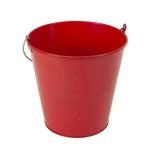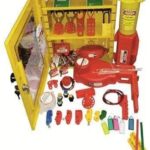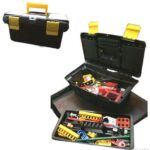Your list is empty, add products to the list to send a request
What to Look for When Buying a Smoke Detector?

19
May
Understanding Smoke Detectors
Smoke detectors are essential devices that alert occupants to the presence of smoke, providing early warning of potential fires. There are several types of smoke detectors, each utilizing different sensing technologies:
1. Ionization Smoke Detectors
These detectors are highly responsive to fast-flaming fires. They use a small amount of radioactive material to ionize air, detecting smoke particles that disrupt the ionization process. However, they are more prone to false alarms from cooking or steam.
2. Photoelectric Smoke Detectors
Ideal for detecting slow, smoldering fires, photoelectric detectors use a light beam to sense smoke particles. They are less likely to trigger false alarms from cooking activities.
3. Dual-Sensor Smoke Detectors
Combining both ionization and photoelectric technologies, dual-sensor detectors offer comprehensive protection against various fire types. They are suitable for areas where both fast-flaming and smoldering fires may occur.
4. Smart Smoke Detectors
Equipped with wireless connectivity, smart detectors can send alerts to your smartphone, integrate with home automation systems, and provide real-time monitoring. They often include features like voice alerts and self-testing capabilities.
Key Features to Consider
When selecting a smoke detector, consider the following features to ensure optimal performance and safety:
Power Source
- Battery-Powered: Easy to install and maintain, but require regular battery replacements.
- Hardwired: Connected to your building’s electrical system, often with a battery backup. They provide continuous power but may require professional installation.
Interconnectivity
Interconnected detectors ensure that when one alarm is triggered, all alarms in the system sound simultaneously, providing comprehensive coverage. This feature is especially important in multi-room or multi-level buildings.
Certification
Ensure the smoke detector is certified by recognized safety organizations such as Underwriters Laboratories (UL) or the European standard EN 54. Certification guarantees that the device meets stringent safety and performance standards.
Alarm Volume
The alarm should be loud enough to wake sleeping individuals and alert occupants throughout the premises. Look for detectors with an alarm volume of at least 85 decibels.
Maintenance Indicators
Some detectors feature indicators for low battery, end-of-life, or the need for maintenance. These alerts help ensure the detector remains functional and reliable.
Placement and Installation Tips
Proper placement and installation are critical for effective smoke detection:
- Bedrooms and Sleeping Areas: Install detectors inside each bedroom and in the hallway outside sleeping areas.
- Living Areas: Place detectors in living rooms, dens, and family rooms.
- Kitchens: Install detectors at least 10 feet away from cooking appliances to reduce false alarms.
- Ceiling Installation: Mount detectors on the ceiling, at least 4 inches away from walls. If wall-mounted, place them 4 to 12 inches below the ceiling.
Maintenance and Replacement
Regular maintenance ensures your smoke detectors function correctly:
- Testing: Test detectors monthly by pressing the test button.
- Battery Replacement: Replace batteries at least once a year, or as recommended by the manufacturer.
- Cleaning: Clean detectors regularly to remove dust and debris that may interfere with operation.
- Replacement: Replace smoke detectors every 10 years, or sooner if they fail to respond to testing.
Recommended Product: Apollo Addressable Optical Smoke Detector
For those seeking a reliable and high-quality smoke detector, we recommend the Apollo Addressable Optical Smoke Detector. This detector features advanced optical sensing technology, ensuring prompt detection of smoldering fires. Its addressable design allows integration into complex fire alarm systems, making it suitable for both residential and commercial applications.
Frequently Asked Questions
Q1: How often should I test my smoke detector?
A: Test your smoke detector monthly by pressing the test button to ensure it’s functioning correctly.
Q2: Can I install a smoke detector myself, or should I hire a professional?
A: Battery-powered smoke detectors can typically be installed by homeowners. However, hardwired or interconnected systems may require professional installation to ensure compliance with local codes and optimal performance.
Q3: Are smart smoke detectors worth the investment?
A: Smart smoke detectors offer additional features like remote alerts, integration with home automation systems, and self-testing capabilities. They can enhance safety and convenience, especially in larger homes or for individuals who travel frequently.
Conclusion
Selecting the right smoke detector is a vital step in protecting your home or business from fire hazards. By understanding the different types of detectors, key features, and proper maintenance practices, you can ensure the safety of occupants and property. At Firesupplies, we are committed to providing high-quality fire safety products and expert guidance to help you make informed decisions.


























